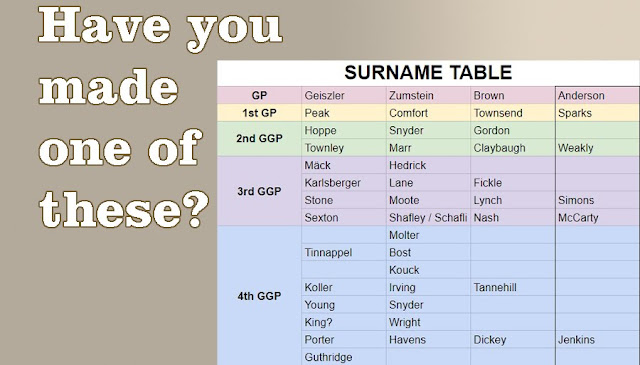How to Write About a Boring Ancestor?
Robbers, adulterers, colorful characters and glorious heroes are among the most interesting people in many family trees. Some of us are descended from great wealth or suffered extreme circumstances. And then, there are the farmers, bakers, milkmen, and day laborers. They lived. They begat children. They died. And there isn't much in between. Or is there?
Question: How can I write about my ancestor when they're not very interesting?
In one three-week writing workshop that I led, I invited aspiring family history writers to pick a more modern ancestor to start with as the access to available details about their lives would be easier to obtain. For one participant, that meant writing about her boring father - her words, not mine. She wasn't certain that she'd have much success but was willing to give it a try.
Before class began on the third week, she stopped me to reveal her excitement. During the past two weeks of home work assignments, she had written two pages about that boring father. She couldn't believe it and she was anxiously anticipating week number three.
The best part was her conversation with her daughter. The conversation went something like this:
MOTHER: "I'm super excited about a writing workshop I'm going to tomorrow."
DAUGHTER: "Okay ?!? Who are you writing about?"
MOTHER: "I'm writing about paw-paw, and it's really fun."
DAUGHTER: "Paw-paw? But he's so dull. How can that be exciting?"
MOTHER: "I know, but it really is. I've written two pages and can't wait to write more."
DAUGHTER: "Two pages hand written, right? That's no big deal."
MOTHER: (Triumphantly) "No, two pages, typed! Single spaced!"
Aw the look of pleasure and pride from this mother who was realizing, her dull father had a story to tell. The question is, who was going to take the time to honor his memory?
If you have boring, normal ancestors on your family tree, how are you going to write about them?
1. Just the Facts Ma'am:
Start with the facts and turn them into basic sentences. You'd be surprised how often the facts are quickly forgotten about people, even parents. Start with the facts and then build upon those facts.
2. Thanks for the Memories
When you have had had personal experiences with the person you're writing about, include those memories, no matter how small. Those moments, no matter how small, tell you a lot about that 'dull' person and should be treasured.
I remember one woman sharing the story about how she'd watch her father and mother dance in their living room. She could paint that picture of her parents. Then one day, something tragic happened in the home. The dull father comforted his wife by taking her into the living room and dancing. A small moment in his less than noteworthy life, but tells you volumes about the couple's love and how to grieve.
Another man told me about his mom. She rarely spoke an unkind thing about anyone else. She quietly served where she could and cared for their home. The kids didn't think they were poor, though they went without many luxuries, but she made the most of what she had. And she made really good cookies!
Finally, one young man only remembered sharing grapes with his grandpa. Folks, I didn't live close to one grandpa growing up, so I didn't have those opportunities. The other grandpa died when I was a baby. That little memory is priceless. I want a grandpa to share grapes with me.
When we stop and remember the ancestors we knew, there will be little things that make a humdrum story have a little more vitality and interest. Write the memories.
3. Open the Time Capsule
Our ancestors lived in a certain time and specific place. What do you know about that place? What do you know about the times they lived?
Imagine the mothers-to-be after two planes crashed into the World Trade Center in 2001. What were they feeling? What were there worries? Was their child entering a drastically dangerous world? Why were they going through with the pregnancy? How would they protect the youngling?
What about the babes? Would they sense the anxiety of their mothers?
I picked a modern circumstance because many of you will be able to understand the event and how it impacted the news. The event affected conversations with family, friends, and strangers. Worship services focused on the violence and the stress. Anxiety was felt by many, but when you think about the life events on a personal level, you can see how it relates to family history.
When a couple married before, during, or shortly after a war, how did that impact them? When a woman gave birth shortly after her husband enlisted in the Civil War, how did that play on her emotions?
When writing about your ancestors, examine the time and place when they were born, married, or died. Examine events when they were having children, or when they buried loved ones. When you examine the world around our ancestors, every person's story has a new layer of interest. And that makes your forgettable ancestor more remarkable.
Everyone Has a Story to Tell. This sentiment is promoted by writer Jeff Goins, the AARP magazine, in TedEx talks, and a show called Story Trekk. Capture the stories, no matter how small. As a descendant, wouldn't you give great sums to know small details about your ancestors, no matter how small?







Comments
Post a Comment